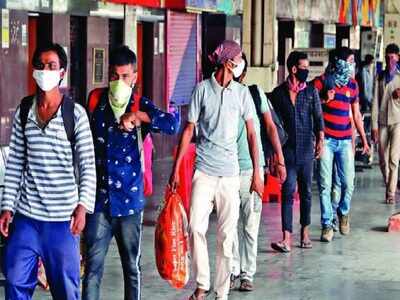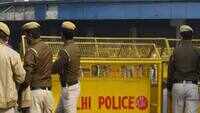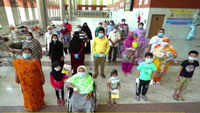
AHMEDABAD: The industries of Gujarat are staring at a huge crisis as migrant labourers are rushing to their home states. The exodus of migrants to Uttar Pradesh, Bihar and Odisha is going to make it difficult for industries in Gujarat to open after the lockdown period. Many industries fear that they will be able to resume operations only after Diwali as many migrants will be engaged in farms at their native places during the monsoon season.
The textile industry of Surat, which employs 12-14 lakh migrant workers, seems stranded for a long time with lakhs of workers gone and more to follow in the coming days. Similar is the case with ceramic industry, construction, engineering tools and other industries which employ more than 50% of their workforce from other states.
“They (migrant workers) are supposed to be treated as labour, factor of production as well as human beings. They were treated as neither in this lockdown period,” said Indira Hirway, director and professor of economics at the Centre for Development Alternatives in Ahmedabad. She said the government should have acted swifter for the migrants to return home after March 24 when a nationwide lockdown was imposed to curb the spread of Covid-19.
Surat is the hub for diamond cutting and polishing and about 90% of the world’s rough diamonds are processed here. The industry employs about 7 lakh diamond workers of whom about 10% are from other states. But more than 70% of the workers are from Saurashtra who have also begun to return home to Bhavnagar, Amreli and other regions of Gujarat. Surat has the largest proportion of migrants among cities in India.
“We don’t think that the industry will be back to normal before a few months,” said a senior official working with a reputable diamond firm in Surat.
The fear runs deeper for the textile industry that employs lakhs of migrant labourers for weaving, processing and embroidery.
“The migrant workers are angry. They suffered a lot in the first 40-odd days of the lockdown and despite numerous representations nothing was done,” said Tarachand Kasat, senior vice-president and chairman of textile committee at Federation of All India Vyapar Mandal. “We fear that 15% of the businesses will shut down permanently. Majority of the migrant workers who have gone to their natives will not return for long, not before Diwali,” Kasat said.
Every month the textile industry of Surat is staring at losses to the tune of Rs 11,500 crore, he added.
Gujarat government has operated 39 trains over the past four days and sent more than 46,000 migrant labourers to their respective states, according to a media statement. Thirty more trains will leave from Gujarat on Wednesday to send 82,000 migrant workers back home, it said. Around 3.25 lakh labourers have been sent to their respective native places through trains and buses till date, it added. The state government shall continue the necessary arrangements for the coming 15 days.
At the cermaic hub of Morbi the situation is not very different from Surat’s textile industry, for it is also largely dependent on the migrant workforce.
“The workers who have left for their native places will not return for a long time,” said Divyesh Patel, director at Clayris Ceramics. “About 60% of the workforce at Morbi’s ceramic industry is from other states. For instance, the sanitaryware industry is largely dependent on workers from Odisha.”
Patel said that the industry will not be function fully before Diwali as many of the migrants will be engaged in farming in their villages with the onset of monsoon season next month.
The textile industry of Surat, which employs 12-14 lakh migrant workers, seems stranded for a long time with lakhs of workers gone and more to follow in the coming days. Similar is the case with ceramic industry, construction, engineering tools and other industries which employ more than 50% of their workforce from other states.
“They (migrant workers) are supposed to be treated as labour, factor of production as well as human beings. They were treated as neither in this lockdown period,” said Indira Hirway, director and professor of economics at the Centre for Development Alternatives in Ahmedabad. She said the government should have acted swifter for the migrants to return home after March 24 when a nationwide lockdown was imposed to curb the spread of Covid-19.
Surat is the hub for diamond cutting and polishing and about 90% of the world’s rough diamonds are processed here. The industry employs about 7 lakh diamond workers of whom about 10% are from other states. But more than 70% of the workers are from Saurashtra who have also begun to return home to Bhavnagar, Amreli and other regions of Gujarat. Surat has the largest proportion of migrants among cities in India.
“We don’t think that the industry will be back to normal before a few months,” said a senior official working with a reputable diamond firm in Surat.
The fear runs deeper for the textile industry that employs lakhs of migrant labourers for weaving, processing and embroidery.
“The migrant workers are angry. They suffered a lot in the first 40-odd days of the lockdown and despite numerous representations nothing was done,” said Tarachand Kasat, senior vice-president and chairman of textile committee at Federation of All India Vyapar Mandal. “We fear that 15% of the businesses will shut down permanently. Majority of the migrant workers who have gone to their natives will not return for long, not before Diwali,” Kasat said.
Every month the textile industry of Surat is staring at losses to the tune of Rs 11,500 crore, he added.
Gujarat government has operated 39 trains over the past four days and sent more than 46,000 migrant labourers to their respective states, according to a media statement. Thirty more trains will leave from Gujarat on Wednesday to send 82,000 migrant workers back home, it said. Around 3.25 lakh labourers have been sent to their respective native places through trains and buses till date, it added. The state government shall continue the necessary arrangements for the coming 15 days.
At the cermaic hub of Morbi the situation is not very different from Surat’s textile industry, for it is also largely dependent on the migrant workforce.
“The workers who have left for their native places will not return for a long time,” said Divyesh Patel, director at Clayris Ceramics. “About 60% of the workforce at Morbi’s ceramic industry is from other states. For instance, the sanitaryware industry is largely dependent on workers from Odisha.”
Patel said that the industry will not be function fully before Diwali as many of the migrants will be engaged in farming in their villages with the onset of monsoon season next month.

Coronavirus outbreak
Trending Topics
LATEST VIDEOS
City
 Preparations in full swing at Mohali railway station to run special trains for migrant workers
Preparations in full swing at Mohali railway station to run special trains for migrant workers  'Bois Locker room' case: Delhi Police arrest 18-year-old boy who was group admin
'Bois Locker room' case: Delhi Police arrest 18-year-old boy who was group admin  Gujarat Congress blames 'Namaste Trump' event for COVID-19 spread
Gujarat Congress blames 'Namaste Trump' event for COVID-19 spread  Argument over face mask turns violent in Chembur; man thrashed brutally
Argument over face mask turns violent in Chembur; man thrashed brutally
More from TOI
Navbharat Times
Featured Today in Travel
Quick Links
Kerala Coronavirus Helpline NumberHaryana Coronavirus Helpline NumberUP Coronavirus Helpline NumberBareilly NewsBhopal NewsCoronavirus in DelhiCoronavirus in HyderabadCoronavirus in IndiaCoronavirus symptomsCoronavirusRajasthan Coronavirus Helpline NumberAditya ThackerayShiv SenaFire in MumbaiAP Coronavirus Helpline NumberArvind KejriwalJammu Kashmir Coronavirus Helpline NumberSrinagar encounter
Get the app




